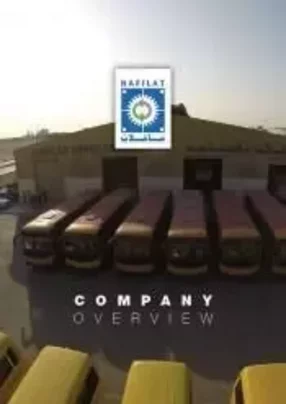Hafilat Industry maintains its position as a leading bus manufacturer in the Middle East through its unfaltering commitment to new technology and ideas; with a turnover last year of just over $100 million, the company certainly has a lot to be confident about. Shrugging off complacency, Hafilat is capitalizing on its strategic position with several major investments, maintaining its core operational formula and crucial partnership with international partners.
Operations
Hafilat’s factory in Mussafah, Abu Dhabi has the capacity to produce up to 300 buses annually; products from this facility have been approved by all the major Transportation Authorities in the region. Hafilats' factory is equipped to build on top of major chassis brands, including Iveco, MAN, Mercedes Benz, Scania and Volvo.
CEO Iyad Al Ansari highlighted that modern principles underpinned the entire manufacturing operation, he said: “At Hafilat we follow the world-class operational standards of our partner, Volgren Australia. Through our ongoing commitment to our ISO 9001 certification, we use Kaizan principles to run an efficient factory.”
It is this reputation that enabled Hafilat to successfully win a bid to supply Cairo’s Transport Authority with 300 buses as part of an initiative to reduce congestion in Egypt’s capital; it has been estimated that upwards of 600,000 people could use these services annually.
Alongside manufacturing, the facility also contains the company’s Customisation and Refurbishment divisions, which can process an average of roughly 250 vehicles annually. Al Ansari explained that the Customization division engaged in some interesting bus conversions, using its bus designs as a basis for an ambulance, a library, a bank, and even a courthouse.
Al Ansari explained one of the most interesting applications of his company’s capabilities: “We are engaged in upgrading taxis in Abu Dhabi to look like traditional London black cabs. We were awarded the contract to support the Abu Dhabi Department of Transport’s pilot project to convert 300 vehicles.”
Competitive Advantage
Al Ansari himself asked: “Why is there only one Bus Company like us in the whole of the GCC?” The answers which uncover Hafilat’s competitive advantage extend far beyond the simple fact that they are the only manufacturer in the region to use aluminum.
He noted the crucial importance that partnerships have played in the company: “Typically it is difficult to get a license to do what we do in the Middle East but through our partnership with international suppliers we have had all the experience and professional contacts on hand.” Not only has this partnership effectively enabled Hafilat to set up in a challenging market, it has also given the company access to world-leading bus chassis designs.
Furthermore, perhaps in recognition of its own uniqueness in the area, Hafilat is keen to explore new niches in search of new growth and opportunities to deliver quality to its company. There was a marked absence of VIP bus manufacturers in the region and demand was particularly high due to cultural reasons; Hafilat had the foresight to see that, combined, these factors presented the company with an opportunity to: “Find a real niche. Markets such as Europe provide a lot for VIPs but not much in the way of buses; customers find ours no less comfy than a Rolls Royce or a Jaguar.”
Another aspect of the business that enables it to successfully compete is its bespoke manufacturing process; Al Ansari said: “The flexibility of our facility really sets us apart; because we don’t mass produce and don’t depend on an economy of scale, we can service the specific needs of a customer. We can even alter buses to the specific requirements of the client; we have a high customization capability that isn’t available from other competitors”
Hafilat has also taken serious steps towards reducing its impact on the environment and is working towards being certified with the relevant ISO accreditations. The company is actively adapting its bus designs in order to reach this goal.
Perhaps the best example of this is the use of lightweight materials; aside from pioneering lightweight aluminium chassis, the company also incorporates polygraphites, ABS and acrylics into its new buses. The net effect of this is that the vehicles are not only lighter and easier to manoeuvre, but also saves a significant amount of energy.
Furthermore, Hafilat has left no stone unturned in its search for sustainability which is evidenced by its use of long lasting LED bus lights, in addition to Tyre Safe tyre technology, which endows its vehicles with a safe ‘run on flat’ capability, reducing the incidence of breakdown callouts and stoppage time. The company has even begun to roll out pneumatic tools in order to reduce its power demand, which shows that no measure is too small if it results in savings and increased efficiency.
Expansion
Instead of staying put in its comfortable position as a currently region-leading bus manufacturer, Hafilat has taken responsibility for its own future and is making significant investments to this end. Al Ansari said: “Our first project is expanding our line in Kuwait as part of a joint venture; we will be spending roughly $20 million.”
He added: “The second is building a new hangar to extend our capabilities in Abu Dhabi, which will be used for fatigue testing. The center will be equipped with latest vibration monitoring and dynamics equipment that can test everything from suspension, brakes and vibration; this will come to about $6.5 million.”
In many ways Hafilat has proven that what seems nigh on in possible can, in fact, be achieved with the right strategy. Building a business centered on the niche interests of a variety of important clients has given the company a watertight base from which to expand these capabilities even further. What is clear from its past, present and future is that, as long as the highest attention is paid to meeting the often oscillating needs of the customer, the business will be sure to succeed.


